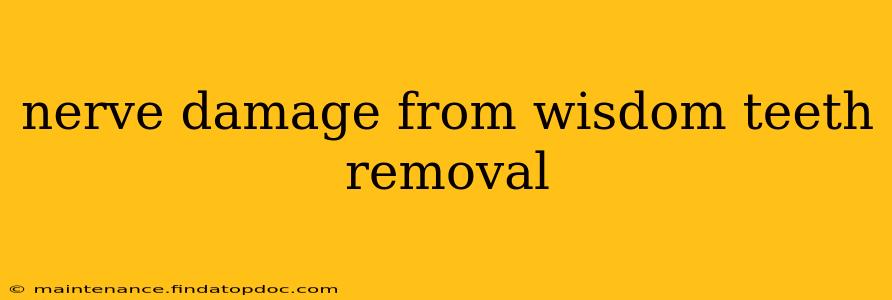Wisdom teeth removal is a common procedure, but like any surgery, it carries potential risks. One of the most concerning complications is nerve damage. While rare, it's crucial for patients to understand the possibility, its causes, symptoms, and the recovery process. This comprehensive guide addresses frequently asked questions and provides valuable information to help you navigate this potential challenge.
What causes nerve damage during wisdom teeth removal?
Nerve damage during wisdom teeth extraction occurs when the nerves located near the wisdom teeth are inadvertently injured during the surgical process. The inferior alveolar nerve (IAN), responsible for sensation in the lower lip, chin, and teeth, is particularly vulnerable. The proximity of the wisdom teeth roots to this nerve makes accidental damage a possibility, especially with impacted wisdom teeth (teeth that are trapped beneath the gum line or bone). The surgeon's skill, the complexity of the extraction, and the patient's individual anatomy all play a role. Sometimes, even with the utmost care, unavoidable damage can occur.
How common is nerve damage after wisdom teeth removal?
The occurrence of permanent nerve damage after wisdom teeth removal is thankfully infrequent, estimated to be less than 1% of cases. However, the possibility remains, highlighting the importance of choosing a qualified and experienced oral surgeon. Temporary numbness or tingling is more common and usually resolves within weeks or months.
What are the symptoms of nerve damage after wisdom teeth removal?
Symptoms of nerve damage can vary depending on the severity and location of the injury. These may include:
- Numbness: A complete loss of sensation in the affected area.
- Tingling: A pins-and-needles sensation.
- Pain: Sharp, shooting, or burning pain.
- Weakness: Difficulty controlling the muscles in the lower lip or chin.
- Changes in taste: Altered or diminished taste perception.
It's important to note that some initial numbness or tingling immediately following surgery is normal due to local anesthesia. However, if these symptoms persist or worsen beyond a few weeks, it warrants immediate medical attention.
How is nerve damage from wisdom teeth removal diagnosed?
A dentist or oral surgeon will typically conduct a thorough examination, assessing your symptoms and checking for any neurological deficits. This may involve testing your sensation in the affected areas, such as the lower lip and chin. In some cases, further diagnostic tests like electromyography (EMG) or nerve conduction studies (NCS) may be necessary to confirm the diagnosis and determine the extent of the damage.
What is the treatment for nerve damage after wisdom teeth removal?
Treatment for nerve damage depends on the severity and whether it’s temporary or permanent. Temporary nerve damage often resolves spontaneously over time, potentially requiring only pain management and time. However, for permanent damage, treatment options may include:
- Medication: Pain relievers and anti-inflammatory drugs.
- Physical therapy: Exercises to help improve nerve function and reduce symptoms.
- Surgery: In rare instances, surgery may be necessary to repair the damaged nerve, although success rates vary.
- Alternative therapies: Some patients find relief through acupuncture or other complementary therapies, although these are not scientifically proven treatments for nerve damage.
How long does it take for nerve damage to heal after wisdom teeth removal?
The healing time for nerve damage varies greatly, depending on the extent of the injury and the individual's healing capacity. Temporary numbness often resolves within a few weeks or months, while permanent damage may require months or even years to heal, and some individuals never fully regain sensation.
Can I prevent nerve damage during wisdom teeth removal?
While you can't entirely eliminate the risk, you can take steps to minimize it:
- Choose an experienced oral surgeon: Opt for a surgeon with extensive experience in wisdom teeth extractions, particularly those involving complex cases. Inquire about their success rate and complication rates.
- Thorough pre-operative assessment: Ensure your surgeon performs a comprehensive evaluation, including X-rays and 3D imaging (CBCT scans), to understand the anatomy and location of the nerves relative to your wisdom teeth.
- Open communication: Communicate clearly with your surgeon about any concerns or questions you may have.
Remember, this information is for general knowledge and does not replace professional medical advice. Always consult with your dentist or oral surgeon for diagnosis and treatment of any dental concerns. Early intervention is key for optimal outcomes in cases of nerve damage.
